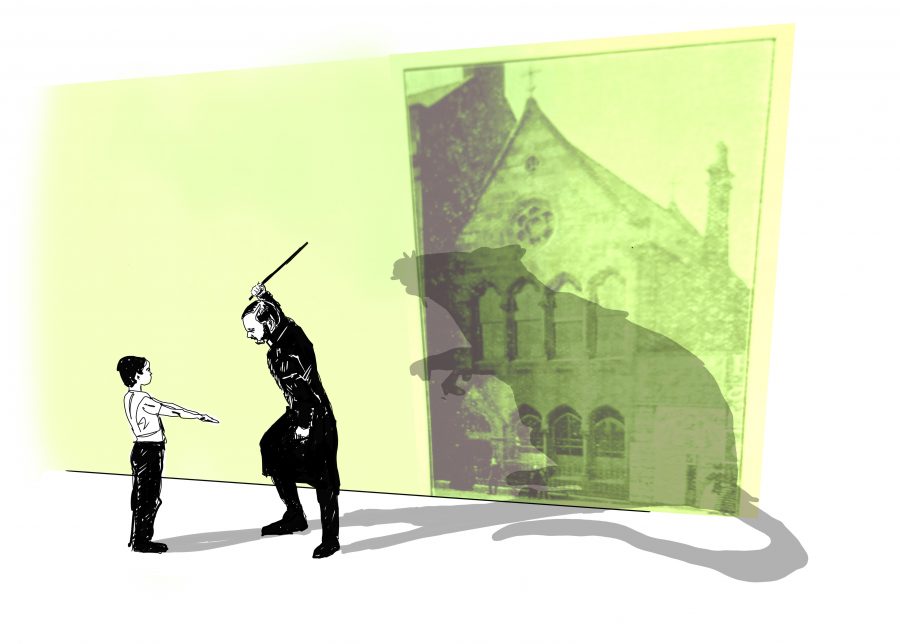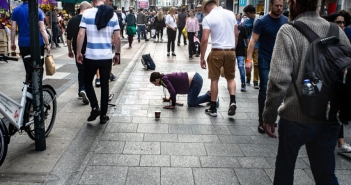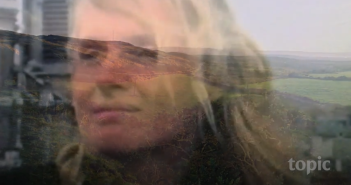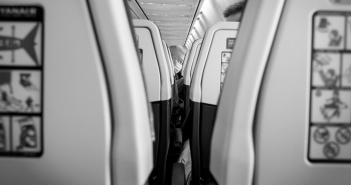1960s Belfast
Sat in silence on the bottom step, with my knees tucked under my chin, I fit snugly inside a ray of sunlight which penetrated the dark hallway through a stained glass window above the heavy wooden door. In the four years since my father’s death, a vindictive, sombre air pervaded the house. Harbors of warmth and light were frail, transient things.
The girls had already left for school and the house was deserted, save for me and my mother, Ruth. She was making the most of a rest before her hard day’s work began, and I was desperate for a reprieve from school. One of the teachers had taken it upon himself to iron out the wrinkles in my character with beatings so severe that I had to attend hospital. Ruth complained about the violence done to her child, but had been told that the teacher in question was soon to be retired, and that taking the complaint any further would be a big stab in the back for Catholic education.
I had survived that teacher’s class, but I still hated school, and by way of a plea, I faked a rasping cough, to which my exhausted mother responded in an exasperated, voice, “If I have to leave my bed to get you out to school, I’ll break your two legs.”
I trudged up Blackwood Street, deliberately scuffing the toes of the shoes my mother had worked so hard to buy. My vain efforts to be excused from school had only made me late again. I would be punished. But there was some compensation. Free from the school kids and workers who had already traveled to their appointed places of toil, the road was not busy and apart from two women downstairs, the empty bus granted me full reign of the upper deck. Rightly installed in the front seat, I surveyed all the little streets, shops and people below. The bus rolled down the Ormeau Road, past where the stink of the gas works leered through the windows, then through the markets to Cromac Street, where it slowed down to turn left, into May Street.
It was just at the corner of May Street, that the bus traveled at its slowest pace, and I jumped from the open platform, running to stay on my feet, when I hit the pavement. I passed the courthouse and turned down the back of Town Hall street as far as the court cells, before turning left to face the high walled police barracks. Their huge open gates allowing a view of the large, impressive cobble-stoned courtyard.
The back entrance to my primary school was defined on one side by the barracks wall, and on the other by a fruiterer’s warehouse, and flour mill. Inside the mill, turned an unmanned machine for loading bags of flour onto lorries. Normally the entry swarmed with boys playing hurling, handball and Gaelic football, soccer being banned on account of its association with England. They fought in the entry too, those high walls amplifying and echoing their screams. But the boys had already answered the morning bell, and the entry was empty.
The mill workers had all disappeared for tea break and apart from the clicking of their unmanned machine, there was an eerie silence in the entry. I had heard of big bombs that can kill all the people and leave their buildings and machinery still standing. The solitary slap of my shoes on the concrete alleyway echoed back with a menacing thought. Had the end of the world come? Was there nobody left but me?
I might have run in blind childish panic had I not seen it. The rat. Like an eighth wonder from a Marvel Magazine, defied gravity and clung four feet clear above the ground. The rat’s body ran parallel with the length of the bricks on the corner of the barracks wall. I had never seen a rat so clearly before. It had brown fur and beady eyes. We observed each other briefly before scurrying in our separate directions. The rat made its way back to the mill, while I ascended a broad, cast iron stairway which led from the yard to the upper floor of the old stone school.
It was a peculiar building built in the 1870s, of large coarse granite stones, with an upper floor jutting out to overhang a part of the walled off school yard. Overall, the place resembled one of the old tower houses, built for protection rather than education.
I tried to sit down unnoticed, on a long wooden bench at the back of the class room, but the black smocked, chubby figure of Brother Andia beckoned to me. He squatted down on his hunkers beside the hearth to bend his leather strap over the open coke fire, which burnt in the center of the partly partitioned room. I stood with little defiance, save a disinterested acceptance of the inevitable.
“ah missed the bus,” I started to say, but the excuse seemed lame so I added, “And ah stopped to watch a rat on the wall in the entry.”
“There are no rats in the vicinity of this school,” stated the Brother categorically.
We were a captivating diversion for the rest of the class and perhaps it was for the entertainment of my audience, that I cheeked,
“If there are no rats in the school, then how come you put rat poison down in the cupboards?” My audience was pleased with the show but Brother Andia was not.
“There are no rats in the vicinity of this school.” He repeated, and had me hold out my hands so that I could be punished for being late. The Brother strapped with unusual brutality, so that each stroke left a red swelling.
After three strokes on each hand, I expected my punishment to end. Arms folded across my chest, the injuries fit snugly into my armpits and I half turned to take my seat. But the Brother caressed me lightly across the face with the strap and smiling sadistically had me extend my hands once more. This time I was to be punished for telling lies about seeing rats.
Brother Andia did not come from Belfast, but from one of the twenty-six counties which were no longer under British rule. His years of experience as headmaster of a school, which existed under pressure, within a sectarian state had taught him the necessity of blind loyalty, and when he strapped me, that was the true message which he wished to convey. Oxford Street Christian Brothers primary school was a good, clean school which had no faults, no problems, and no rats.
The Brother continued to strap. Blubbering, I stood there, forced by my naive, stupid stubbornness, to stick to my story.
There was…
a rat on the wall.
Illustration by Malina | Artsyfartsy
facebook.com/this.is.artsyfartsy/




